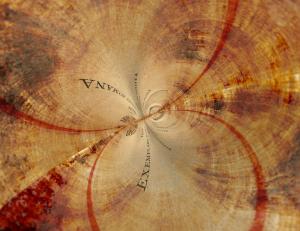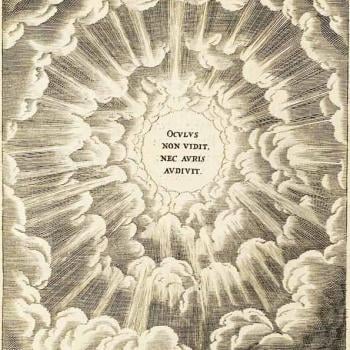 God, being beyond all exiting things, transcends human reason. Any attempt to define God using reason to establish names by which God could be called would lead us away from God as it would not be God but some simulacrum of God which is established. For this reason Dionysius said that neither is there expression [λόγος] of It [God], nor name [ὄνομα], nor knowledge [γνῶσις] which comes from human attempts to logically express [λόγος] who they think God is. God is not to be defined by us.
God, being beyond all exiting things, transcends human reason. Any attempt to define God using reason to establish names by which God could be called would lead us away from God as it would not be God but some simulacrum of God which is established. For this reason Dionysius said that neither is there expression [λόγος] of It [God], nor name [ὄνομα], nor knowledge [γνῶσις] which comes from human attempts to logically express [λόγος] who they think God is. God is not to be defined by us.
In Greek, the word which Dionysius employed here for word, λόγος (logos), can mean several things at once. It can be used to indicate an expression which has been said. But implied with that expression is the notion that there is some principle, some logical idea, which serves as the foundation for what has been said. In this way, it is the principle behind the expression which is often more important and is implied by the use of the word logos. Similarly, as it can express the idea or logic behind a given expression, it can and also serve as an indication of the reason or principle or rule which lies behind God’s creative activity (which ties with the reason why the second person of the Trinity is referred to as the Logos because all creatio is said to be made in and through him). St. Albert the Great, understanding the different possible meanings intended with the word, said that the intent here was to deny the ability of human reason to establish a logical or rational principle which we can use to refer to God and comprehend God through it: “ `It has no explanation’: which would make it possible for us to reason about it.”[1] If there were a humanly constructed analysis which could lead to us to explain who God is in himself, God would be limited to what human logic could apprehend; this would mean God himself were limited and easily comprehensible by us. For this reason, Dionysius denies reason for giving us an absolute foundation by which we can know and comprehend God: reason is a good tool, but it is insufficient in itself, especially when the tool itself is constructed by and for a limited intellect.
Reason cannot lead us to know God in such a way we can make explanations for him, putting him in the realm of causality with the rest of being: God is not, after all, in the realm of being, a thing like all others with a rational principle that places him in the realm of being making him one among many beings. Those who try to use pure reason to attain to God will fail to do so: they will attain a God which mirrors themselves, perhaps abstracting the best elements of themselves in order to do so, but yet still establishing a God in their own image and likeness instead of the other way around.
Thus, it is normal for reason to take some essence which it believes it understands, and use that knowledge to construct some word or name which it this is appropriate for it. Such a word will allow knowledge of that essence to be shared with others. God, being beyond reason, is incapable of being put down into a particular name which absolutely fits him because reason cannot contain him and know him. Without such a name, then absolute knowledge about God cannot be shared about with others. That is, when Dionysius denied that there can be knowledge about God, he is denying that our human intellect can discern who God is through reason and establish through reason explanations for God which can then be known and shared among all others. It is not a denial of our ability to apprehend God, nor does it deny we can come to know about God through such apprehensions. What he gave is a denial of the human ability to abstract its way to the truth of God by reason for God transcends reason. This is not to say there will be no explanations, no reasonable engagement, about God in the level of kataphatic theology: but what is produced through such an engagement must never be construed as being more than a convention being used to help us understand the God of our faith on the level of understanding which is possible for us.
For this reason, then, in the scholia presented by Anastasius, we read that we must stop ourselves from trying to define God:
Each soul must cease to jump rashly to a definition of God from the structure of all that surrounds him, and, in silence, cultivate the truth of the divine being alone, a truth which is indescribable, over the intellect, and the highest understanding of all. If, then, no one wise can know the structure of the substance of realities according to which they have been founded, who would dare to define God in any word?[2]
We try, in our own way, to construct order in the universe; we try to understand it, and define the things within it. God, while he can be said to be everywhere present and fill all things, transcends the universe and what can be defined. God is the cause of all things, the one who gives them their defining essences, those essences which we use to help us in our own understanding and mapping out of the universe, even as he remains beyond all definition, all attempt of rational explanation. We can take what he gives us of himself in revelation, our encounter with God, and use it to help us understand our relationship with him, but in the end, “…there is no knowledge or naming which reaches the cause of all things in what it is in itself.”[3] Whatever we establish in our theological analysis is at best a representation for God which we can use to point to him; if we try to hold on to it too tight, we risk making it a replacement for God. Not understanding the difference between conventional truth and the absolute truth will lead us to confuse our own definitions with the absolute in itself and so we will close ourselves from the transcendent truth of God. We must silence ourselves in front of God; we must stop trying to define him. Once it is understood that reason cannot establish God, then the limitations which come from our attempts to describe him and represent him through kataphatic theology will not lead us astray. Then we can appreciate such theological exploration as we understand the relative value of such theological explanations.
[IMG=Old Antique Bible [CC0 Creative Commons] via pixabay]
[1] St. Albert the Great, “Commentary on Dionysius’ Mystical Theology” in Albert & Thomas, Selected Writings. Trans. Simon Tugwell, OP (New York: Paulist Press, 1988), 197.
[2] Anastasius in A Thirteenth-Century Textbook of Mystical Theology at the University of Paris. trans. L Michael Harrington (Paris: Peeters, 2004), 109.
[3] Robert Grosseteste, “De Mystica Theologia” in Mystical Theology: The Glosses of Thomas Gallus and the Commentary of Robert Grosseteste on De Mystica Theologia. Trans. and ed. By James McEvoy (Parish: Peeters, 2003), 119.
Stay in touch! Like A Little Bit of Nothing on Facebook













